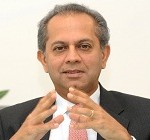The rupee has seen a precipitous drop over the last year, down 7.5% from 55.9 to the dollar and now hovering over the 60 mark. Certainly the current decline was the immediate result of the US Federal Reserve tightening bond buying which led to foreign investors pulling money out of emerging markets. But Tarun Kataria, the CEO of Religare Capital Markets India, predicted eight months ago that the rupee would hit this low, and says Indian policy has contributed handily, with serious implications for the country. He spoke to Gateway House’s Manjeet Kripalani on the issue.
Q: You had called the rupee’s drop to 60 vs. the dollar nearly eight months ago. What red alerts did you see that led to your call?
The currency, bond and equity markets were being propped up by FII flows. This was driven by the U.S Federal Reserve’s $85 billion a month bond buying program that has pumped nearly $2 trillion into the global markets. Regrettably, almost no reform measures have been passed in India to provide a measure of support to the macro economy. It was therefore a matter of time before the FII flows reversed themselves putting pressure in the INR.
Q: What does this mean for India – the markets, businesses, the consumer, the economy and the government?
I remain very concerned about the implications for India. We are running large trade and current account deficits which we must finance. Here too our dependence on foreign flows makes us highly susceptible to the drying up of inbound flows. With long term U.S. rates having risen some 100 basis points in the past few weeks and India rates having declined on the back of a rapidly slowly economy, the rate differential does not make up for the incremental risk of investing in Indian bonds.
For businesses, there is little incentive to invest in India. As a result the capex cycle has come to a standstill. At the same time, businesses that invested some years ago in the hope of an economic revival now find themselves over levered and unable to meet their debt commitments. This of course has put pressure on banks where NPLs are high reducing their incentive to lend. The consumer too will feel the effect of this and start of pull back on spending.
In addition, it’s entirely possible that we see imported inflation again putting upward pressure on interest rates which will also serve to curb consumer spending. The government regrettably is out of sorts. So it’s a vicious circle that only strong macro leadership can extract us from. That of course is absent.
Q: What steps should the RBI recommend to the government immediately and in the long term?
The RBI has done what it can. This needs to be supported by reforms that help drive the economy forward. Much has been announced, little has been executed. Land and labour reform, reduced subsidies, coal block allocation, approval of power projects, and execution of infrastructure projects are some of the reforms that must be instituted immediately. The effect of these reforms will take months to take root. India doesn’t have the time. We run the risk of a balance of payments crisis which will put enormous pressure on the macro economy through a depreciating currency and a spike in interest rates.
Q: What does it mean for emerging markets – is this a secular trend? What is needed to reverse this trend?
For now the bloom is off the emerging markets rose. Brazil, Russia and India are generally being mismanaged, China is structurally reforming itself from an export nation to a consuming nation so in the interim will slow down to 7% growth. At the same time, the US is back on its feet attracting global capital. A new round of reforms will be required to rejuvenate emerging market economies. Remember that the emerging markets have all that it takes to jump start growth – high savings, a large consuming population, rising wealth and attractive demographics.
Q: What can India do to reverse this trend?
Reform, reform, reform! Sadly, our fractured political leadership has not allowed this. Unfortunately, we will need a crisis to goad us into action. This can’t be far away.
Tarun Kataria is CEO of Religare Capital Markets India where he oversees the build out of the Merchant Banking and Institutional Equities businesses.
Manjeet Kripalani is Executive Director, Gateway House
This interview was exclusively conducted for Gateway House: Indian Council on Global Relations. You can read more exclusive content here.
For interview requests with the author, or for permission to republish, please contact outreach@gatewayhouse.in.
© Copyright 2013 Gateway House: Indian Council on Global Relations. All rights reserved. Any unauthorized copying or reproduction is strictly prohibited.


